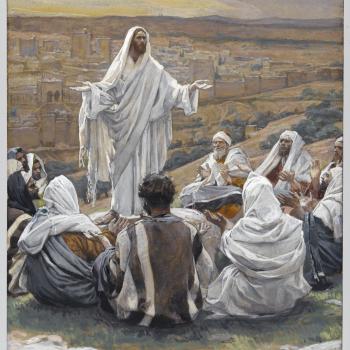My Catholic friends reassure me that I know nothing about guilt. They are experts. The very ritual of confession generates guilt, they say. They remember feeling guilty that they didn’t feel guilty, and making up sins to confess. The darkened confessional, the sliding door, the whispered prayers, the priest’s questions – all operated as a virtual guilt production line. Even worse was when they didn’t go to confession or attend Mass. And then saw the priest at school. More guilt, dark, dreadful, heavy, frightening.
My Episcopal friend reassures me that I know nothing about guilt. Her journey from Swedish Lutheran family roots to the Conservative Presbyterian Church, from a Covenant high school to a Baptist nursing school qualify her as a verifiable connoisseur of guilt. Sin hung over her head like Linus’s rain cloud, threatening every gleeful moment with shame. Worse yet, there was no system of guilt relief. No confessional with its brief reprieve. No wiping the slate clean. Just the buildup of culpability and the nagging, gnawing feeling of not being good enough.
My Jewish friends reassure me that I know nothing about guilt. How could I? My mother wasn’t Jewish. Only a Jewish mother could possibly know how to wield guilt like a sculptor’s tool, shaping and honing a soul perpetually driven by that voice, scolding, harassing, reprimanding. Nothing was ever good enough.
Eastern religions might look at these Western systems and guffaw: “That’s nothing! Try karma. You’ll pay for everything single thing, sooner or, most likely, much later…and for a very long time.”
Yet many 21st century psycho-gurus tell us to shed our guilt and shame, trying to convince us it’s morbid and unnecessary. Others reject the notion of sin and think about wrongdoing as simply falling short of their own values and virtues; they prefer ideas of personal integrity and common human values of kindness and goodness to the possibility that there is Someone else out there who is hurt by what we have done. Religion is, for them, primarily a guilt thermometer, registering unacceptable levels of moral malfunctioning. Or perhaps it merely serves as a purge, a way to reaffirm ourselves as we flush out what we deem inacceptable.
Yet we all know that gnarly wriggling in our souls over our inability or unwillingness to do what we know is right and good. And here is the beautiful thing about sin. It is not primarily about divine law, or moral failure, or lack of perfection, with all the guilt that accompanies these. Nor is it about personal integrity and common human values of goodness and compassion. It’s about the nature of relationship. It’s about something that comes between us and Another.
A lion that takes down a baby elephant and eats it is not being cruel or immoral or horrible. We watch a video of something like that and we may cringe. It seems so, well, wrong. But it isn’t, because the lion’s relationship with God is purely one of Creator-creature, and the creature is doing and being what the Creator so established it would do and be.
But we, who are made in the image of God and then renewed and transformed into the image of Christ, are in a different kind of relationship with God. Yes, Creator-creature, but also more than that. The divine hospitality within the Trinity—a generosity that invites us to share in love and creativity and God-likeness—means that we must practice all the arts of relationship with God just as we would with a human person. We don’t read about someone in a book somewhere, believe that person actually exists, and then conclude we have a relationship with that person. No, for relationship to exist, we enter into channels of communication, self-revelation, consideration, and engagement. And the more deeply we want the relationship to go, the more we conform our lives to that other person.
Sin, then, is the declaration that love has been violated. It is our betrayal of the relationship. It is unfaithfulness in word, in attitude, in habit, in desire. And that is good news, actually. It means that there is a relationship there to which we are called rather than a code or law or standard that we must live up to. Guilt should provoke in us the kind of repentance that seeks reconciliation, not the kind of remorse that does nothing but wreck your self-esteem. It’s not about perfection; it’s about passion.
Sin, then, is to be feared and loathed not because it mars our record or makes us feel shame or damages our reputation or jeopardizes our “accounts” with God. We fear and loathe sin because it breaks God’s heart and keeps us from trusting and loving him fully and without restraint.
John Wesley once said, “Give me one hundred preachers who fear nothing but sin, and desire nothing but God, and I care not a straw whether they be clergymen or laymen; such alone will shake the gates of hell and set up the kingdom of heaven on earth…”
The flipside of fearing sin is desiring God.
Guilt and shame are imperfect guides to the relationship. Sometimes we feel them when we needn’t; sometimes we don’t feel them when we should. But perhaps the course-correction to our feelings that we need is that flipside: desiring God.
In her biographical comments on Teresa of Avila, Carol Flinders writes this: “One cannot break attachments by force, Teresa discovered; they are the expression of an inner hunger. When that hunger is assuaged, attachments will fall away with almost no effort on our part.”
And while you probably couldn’t have put Teresa in the same room with Martin Luther, he would concur: “Preaching that tells us we are sinners instills hope, not despair. Such preaching about sin is a preparation for grace. . . . Yearning for grace wells up when sin is recognized.”
So. Perhaps this Thanksgiving, as we sit down to satisfy our hunger, we could also give thanks for the recognition of sin: it pushes us to name the hunger for God within us, and be filled with the bread of life.
Photo: tudor-rose, Flickr C.C.












